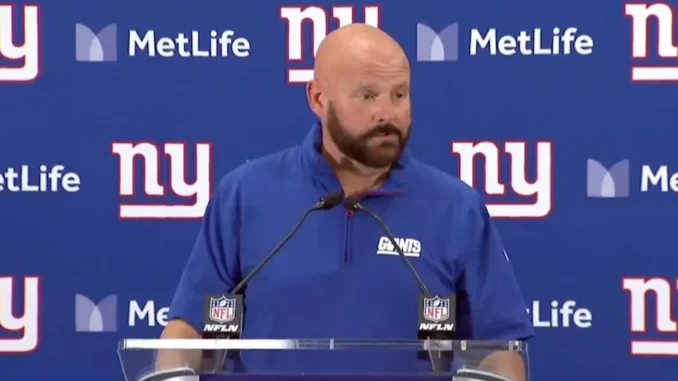
In a pivotal moment for the New York Giants, head coach Brian Daboll made the bold decision to switch quarterbacks during a high-stakes game, signaling a significant shift in the team’s strategy moving forward. With Daniel Jones starting the game, the Giants struggled to find rhythm against a tenacious defense, and Daboll felt a change was necessary to ignite his team. The in-game switch aimed to provide a much-needed spark and reignite the Giants’ offense as they navigated a challenging season.
The game started with high hopes for the Giants, who were looking to build on their previous performances. Jones, entering his third season as the starting quarterback, had faced his share of challenges, but expectations were high. The coaching staff had invested time in developing his skills, and there was hope that he could lead the team to victory. However, the first half was a struggle, marked by missed opportunities and a lack of offensive cohesion.
As the clock ticked down in the second quarter, the Giants found themselves down by two scores, with the offense sputtering and unable to establish a consistent rhythm. Jones, despite his best efforts, was unable to find open receivers and faced relentless pressure from the opposing defense. The frustration was evident, both on the field and in the stands, as fans began to voice their discontent.
Recognizing the urgency of the situation, Daboll made the decision to bring in backup quarterback Tyrod Taylor. It was a move that sent shockwaves through the stadium and prompted immediate speculation about the future of Jones as the starter. Daboll later explained that he felt the team needed a different approach to reinvigorate the offense and boost morale.
Taylor’s entrance was met with mixed reactions. Some fans cheered the decision, hoping for a change in fortunes, while others worried about the implications for Jones’ development and confidence. Regardless, Taylor’s experience and dual-threat capabilities offered the Giants a different dynamic, one that could exploit the defense in ways Jones struggled to do that day.
As the game progressed, Taylor’s impact was palpable. He brought a sense of urgency and poise that had been missing. His first few plays showcased his ability to escape the pocket and make plays on the run, qualities that immediately energized the Giants’ offense. A crucial drive late in the third quarter culminated in a touchdown pass to Darius Slayton, bringing the Giants back into contention and electrifying the crowd.
The switch not only shifted the momentum but also provided the team with a renewed sense of hope. The sideline buzzed with energy, and players rallied around Taylor. The offensive line seemed to respond, giving him the protection he needed to execute plays effectively. The Giants’ running game also benefited, as defenders were forced to respect Taylor’s ability to extend plays and scramble.
Despite the offensive resurgence, the game ultimately ended in disappointment for the Giants. They fell short in a nail-biter, but the spark generated by Taylor’s performance could not be overlooked. Daboll expressed pride in the team’s resilience and commended Taylor’s ability to step up in a challenging situation. It was clear that the decision to switch quarterbacks had not only impacted the game but also provided valuable insights for the coaching staff moving forward.
As the team regrouped after the game, the conversation naturally turned to the quarterback position. While Daboll reiterated his belief in Jones and his potential, the performance of Taylor raised questions about the immediate future. The head coach indicated that the quarterback competition would be revisited in the days following the game, emphasizing the need for the team to evaluate what gives them the best chance to win moving forward.
For Jones, this development presented both a challenge and an opportunity. He would need to respond positively to the adversity of being benched and work diligently to regain his position. It was a pivotal moment in his career, and how he handled it would define his trajectory with the Giants. The coaching staff encouraged him to use this experience as motivation to refine his skills and enhance his understanding of the game.
As the Giants prepared for their upcoming matchups, the atmosphere was charged with uncertainty but also with potential. The quarterback situation would be a key storyline, and the decision about who would start moving forward could impact the team’s direction. Daboll’s willingness to make tough calls demonstrated his commitment to winning and his focus on fostering a competitive environment.
The Giants’ fanbase watched closely, eager to see how the coaching staff would navigate this pivotal moment. Would Jones reclaim his starting role and respond to the challenge, or would Taylor’s performance lead to a more permanent change? The answers would soon unfold as the team continued to work toward a more productive and successful season.
Ultimately, this in-game quarterback switch represented more than just a tactical move; it encapsulated the challenges and unpredictability of the NFL. The Giants were at a crossroads, and how they handled this situation would be crucial for their success moving forward. With both Jones and Taylor capable of leading the team, the coming weeks promised to be filled with intrigue and potential as the Giants aimed to find their footing in an unpredictable league.
Leave a Reply